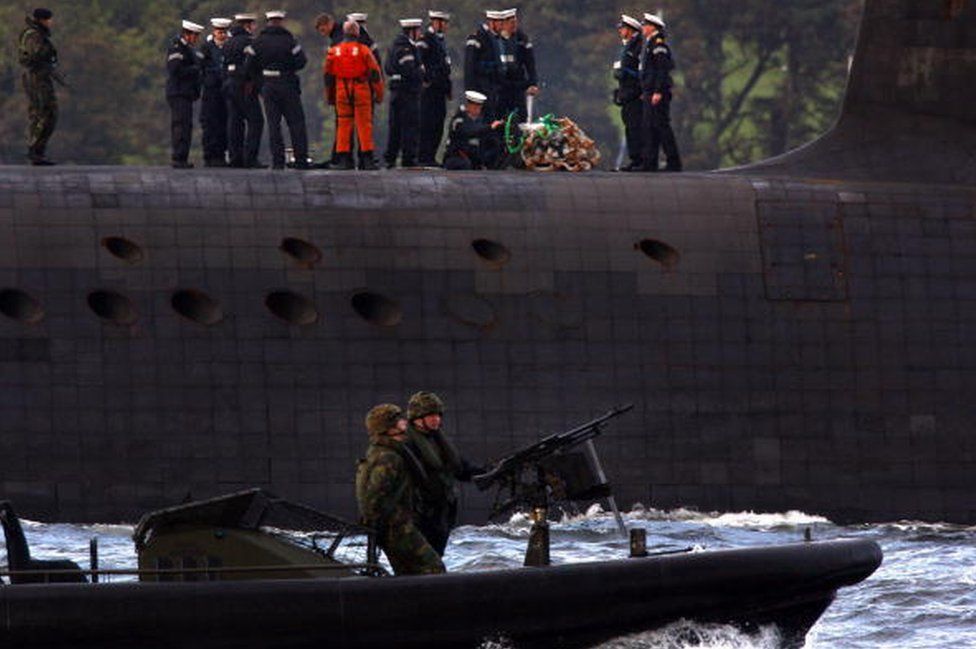How important are UK's nuclear weapons?
- Published

Britain's nuclear weapons programme is in a curious position.
As far as the Conservative government is concerned, the Royal Navy's four Vanguard class ballistic missile-carrying submarines will be replaced by an improved system that will enter service between 2028 and 2035.
No parliamentary decision has yet been taken but the government is pressing ahead, for example, by announcing last month about £500m of investment at the submarine base at Faslane on the Clyde.
But other political forces do not share this view. The Scottish National Party has an important voice - Faslane, after all, is in Scotland.
It cannot derail any decision to modernise but it does not like it.
Now the recently elected Labour leader Jeremy Corbyn adds a new factor to the mix.
A confirmed unilateralist with a general scepticism towards the use of military force - he was chairman of the Stop the War Coalition - he insists that there are no circumstances in which he would press the "nuclear button".
His unilateralism is not shared by many in the Parliamentary Labour Party, but certainly touches a vein among many grass-roots Labour activists.
So what does this all mean for the debate surrounding Trident and its future?
Debate over?
Well as far as the Conservative government is concerned the debate is pretty much over.
Chancellor George Osborne, in announcing the new contracts at Faslane, repudiated the views of those who want to see the Trident missile-carrying submarines scrapped.
"In an uncertain world, are we really content to throw away Britain's ultimate insurance policy?" he asked.
He then set out the essential justification for maintaining the programme, saying: "The new unilateralists of British politics are a threat to our future national security. In a world that's getting more dangerous it would be disastrous for Britain to throw away the ultimate insurance policy that keeps us free and safe."
Some also suggest that Britain's seat at the top table of international politics, its seat on the UN Security Council for example, is also because of us being one of the few nuclear-armed nations.
This may have been true during the early years of the UN - it is no accident that the permanent five members of the Security Council are all nuclear-armed - but it is hard to see how the fate of Trident might alter this.
Another factor that is often brought into the debate is Britain's close security relationship with the US.
Might this be weakened if Britain gave up its nuclear weapons? Would Britain be seen in Washington as a less serious security player?
The counter-argument put by those who oppose any renewal is to argue that nuclear weapons are not relevant to most of the threats facing Britain; that we should set an example by honouring our disarmament pledges under the Nuclear Non-Proliferation Treaty and that the cost means that more useful conventional forces are strapped for cash.
An independent cross-party inquiry into nuclear defence policy published its report in July 2014.
It accepted that most new and emerging security threats did not lend themselves to being dealt with by having nuclear arms.
It nonetheless picked out three scenarios where the possession of nuclear weapons might be relevant:
- The re-emergence of a nuclear threat from a significant nuclear player, for instance a resurgent Russia
- An existing nuclear player - say North Korea - developing a genuinely global threat capable of reaching the UK
- The emergence of a future threat from other weapons of mass destruction, biological for example, where nuclear weapons might have some deterrent practicality
The whole debate over the fate of Britain's nuclear programme involves complex strategic, moral and political aspects.
Mr Corbyn may be a long way from even convincing his parliamentary colleagues of the merits of his position.
But his beliefs mean that the future of nuclear weapons is likely to figure prominently in the foreign policy debate surrounding the next general election.
Related Topics
- Published23 May 2017
- Published30 September 2015
- Published9 April 2015
- Published26 February 2015